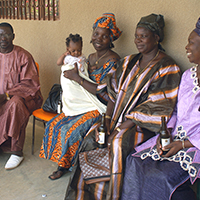
1. Introduction to the People Chemistry Model for Personal, Organizational & Societal Behavior
- Introduces the primary PC model and its structure
- Provides key examples of its principles in civilization development, modern political history, and contemporary business
- Demonstrates its application in consensus building at the project and management team levels

2. Application of the People Chemistry Model to Organizational Structure & Function
- Illustrates the application of the model’s principles to organizational structure, in order to help an organizational maintain relevance with its market, from a strategic planning, product development and customer fulfillment standpoint.
- Provides positive examples of the proposed structure results from modern political history and contemporary business
- Provides negative examples resulting from the absence of the proposed structure, including the loss of market relevance and corporate demise.

3. Application of the People Chemistry Model in Education and Career Planning
- Proposes a strong relationship between PC profiles and educational and career preferences
- Introduces principles for identifying PC attributes during different phases of educational and professional development, and applying this understanding to making education and career choices that are lkely to produce a more satisfying work-life balance.

4. Bonding Preferences in Personal & Leadership Relationships
- Demonstrates bonding patterns in the following personal relationships based on PC profiles:
- Friendship
- Marriage
- Parent-child
- Professional (superiors, peers, subordinates)
- Demonstrates bonding patterns in leadership relationships at the following societal levels based on PC profiles:
- Clan & Tribal (in both primitive and modern contexts)
- Organizational (Private, Public, Voluntary)
- International

5. Application of the People Chemistry Model in Conflict Resolution
- Introduces the following secondary PC models in relation to conflict resolution
- Five Key Motivators of Human Behavior (Motivator Model)
- Basic Principles of Societal Resource Management (Resource Model)
- The Dynamics of Trust in Personal, Organizational and Societal Relationships (Trust Model)
- Discusses the relationship between the full PC profile and the above secondary models, focusing on:
- Legitimate needs and expectations of each CPT
- Common areas of conflict between CPTs and their cause, whether it be at a personal, organizational or societal level
- Introduces principles of conflict resolution in personal and leadership relationships, by:
- Confirming the legitimate needs/expectations of each party
- Applying the principles of the Trust Model and Resource Model to prioritize tangible and intangible resource sharing toward a better balance in satisfying the legitimate needs of each party
- Leveraging innovation to address resource shortfalls that often form the basis of conflict
- Managing illegitimate needs/expectations while legitimate ones are being addressed

6. Societal Application of the People Chemistry Model in Mature Democracies
- Discusses legitimate expectations of democratic governments by their citizens, including:
- The fundamental ideals of democratic government
- Where modern democracies have succeeded and why
- Areas of vulnerability still remaining in modern democracies
- An opportunity to further advance the practice of democracy toward its fundamental ideals.
- Proposes societal priorities based on the Motivator Model and Resource Model
- Introduces consensus building at a societal level regarding:
- Domestic & international goals
- Domestic & international priorities
- Discusses principles of building societal trust through government transparency and accountability, while maintaining national security
- Explores the need to proactively evaluate major political, economic and cultural innovations before their societal application
- Explores approaches to improved voter education and engagement

7. Societal Application of the People Chemistry Model in Developing Countries
- Discusses the development and practice of democratic ideals in:
- New democracies
- Transitioning oligarchies
- Entrenched oligarchies
- Explores principles of equitable resource development
- Resource development planning
- Societal development planning
- Building societal trust through appropriate levels of transparency and accountability